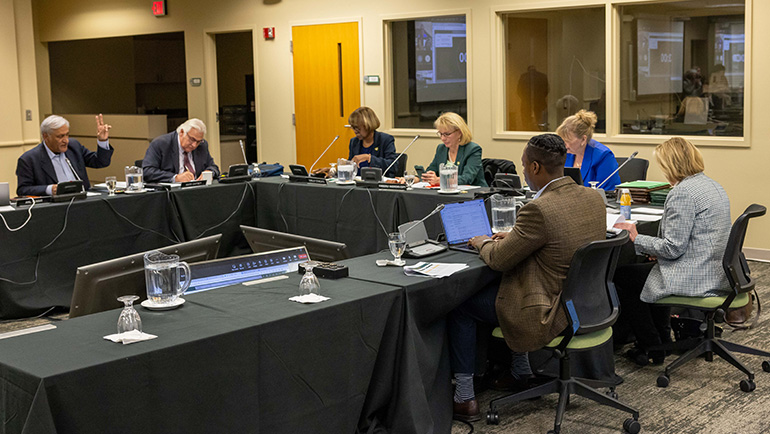
DETROIT – There will be no housing rate increase in Wayne State University residence halls and apartments for the 2024-25 academic year. The announcement came during the Board of Governors’ general meeting on April 26 at the Eugene Applebaum College of Pharmacy and Health Sciences.
“We understand the impact that the cost of college has on Wayne State students and work really hard to try to contain those costs,” said Trish Romer, associate vice president and chief housing officer. “We know that we need to continue to contain costs and make sure that our cost value proposition for our services resonates with our students.”
Compared to other Michigan public universities, WSU campus housing has always been competitively priced. With the past two years of flat to relatively flat room-rate increases for first-year students, WSU’s average will remain at $11,956, which is $107 below the state average of Michigan’s public universities.
Romer reminded the board that campus housing and dining are voluntary, “so it really does matter what we provide. The value in the costs really do drive perception among students.”
However, the board did unanimously approve a 3.17% increase for all meal and block plans for the 2024-25 academic year.
According to the U.S. Bureau of Labor Statistics’ Consumer Price Index (CPI), food commodity inflation outlooks indicate an overall increase of 4% to 5% with the highest projected increase of up to 9% on groceries. The annual WSU meal plans will see an increase between $32 and $69.
“Food away from home, like restaurants and dining halls, increased 4.5% over the previous year, while food at home only increased 1%,” Romer said. “As we look at the projections for food commodities related to collegiate housing, they're anticipating a 4% to 5% increase in commodities for the upcoming year.”
WSU RESEARCH AWARDS THROUGH Q2 EXCEEDS $116 MILLION
So far this year, Wayne State professors have received an anticipated total of more than $116 million in external sponsored research awards, an increase of more than 28.1% from FY23 at the same time. The funding will enable scientific discoveries through research addressing a wide range of needs, including human health and the environment.
The top recipients of funding through the end of March were the School of Medicine ($73.2 million), School of Social Work ($5.9 million), Law School ($5.4 million), College of Engineering ($5 million), College of Liberal Arts and Sciences ($4.4 million), Eugene Applebaum College of Pharmacy and Health Sciences ($3.6 million) and College of Nursing ($3.3 million).
The largest award of this quarter, $9.6 million from the National Cancer Institute of the National Institutes of Health, went to Ann Schwartz, Ph.D., professor and associate chair of oncology at the School of Medicine and vice president and deputy director of research and academic affairs at the Barbara Ann Karmanos Cancer Institute, for the study “Genetic Variation in Cancer Risk and Outcomes in African Americans.” The project includes three large studies that will work to improve the identification and clinical management of hereditary and multiple primary cancers in African Americans, a population that is underrepresented in genetic research.
“Through the important work of our faculty, Wayne State is playing a critical role in improving the lives of Detroiters and beyond,” said Ezemenari Obasi, Ph.D., vice president for research at Wayne State. “In addition, many of our funded programs provide our students with hands-on learning opportunities that will better prepare them for their future careers. I look forward to the future impact of our faculty and students.”
NEW DOCTORATE PROGRAM APPROVED
The Board of Governors approved the establishment of the occupational therapy doctorate (OTD) program in the Eugene Applebaum College of Pharmacy and Health Sciences.
Founded in 1944, Wayne State’s occupational therapy program is one of the first such programs established in the country, successfully educating thousands of occupational therapists who continue to practice throughout metro Detroit as clinicians and leaders in the field.
The OTD program will begin with a cohort of 15-25 students.
“This is a profession that views health very broadly and values participation in daily activities or ‘occupations’ as essential to human health and well-being,” said Laurie Lauzon Clabo, provost and senior vice president for academic affairs. “We also believe occupational therapy is an essential resource for people of all ages, but particularly for those living with chronic health conditions and disabilities that challenge their ability to be independent in daily life.”
The OTD program will require 103 credits of coursework, including 12 hours of Level II work where students will work on therapeutic skills in clinical settings and eight hours in the Capstone Experiential, the final component of the program.
Wayne State will be the fourth Michigan school to offer the program, joining the University of Michigan-Flint, Western Michigan University and Concordia University.
